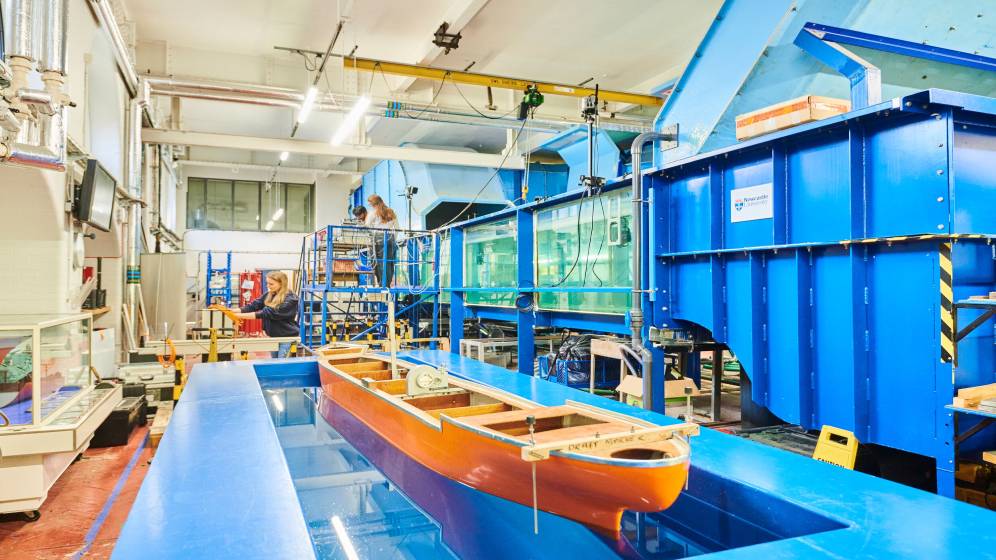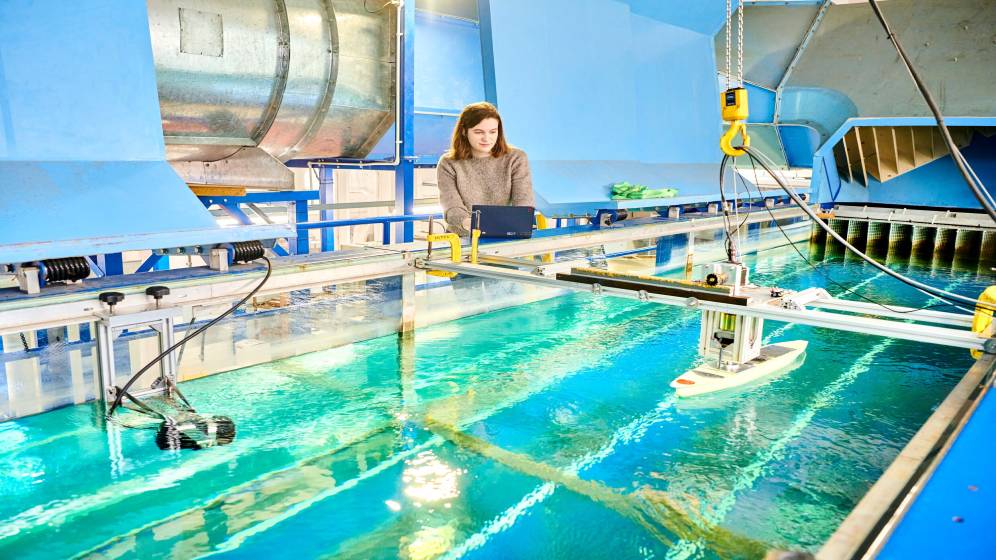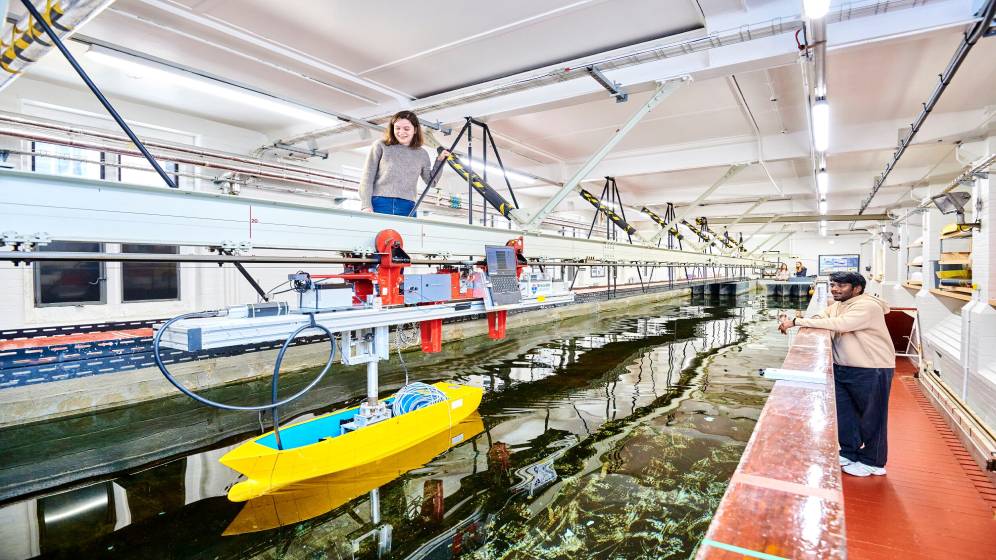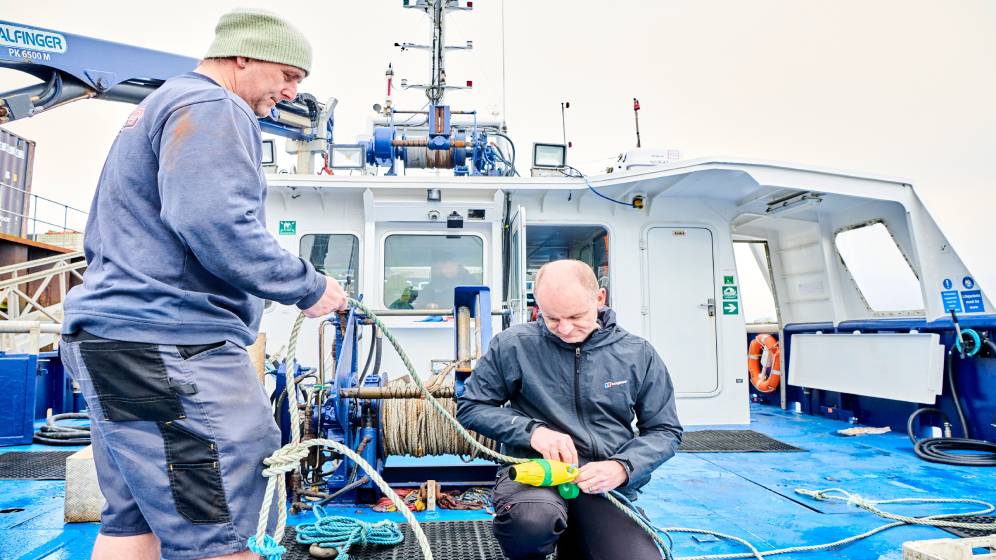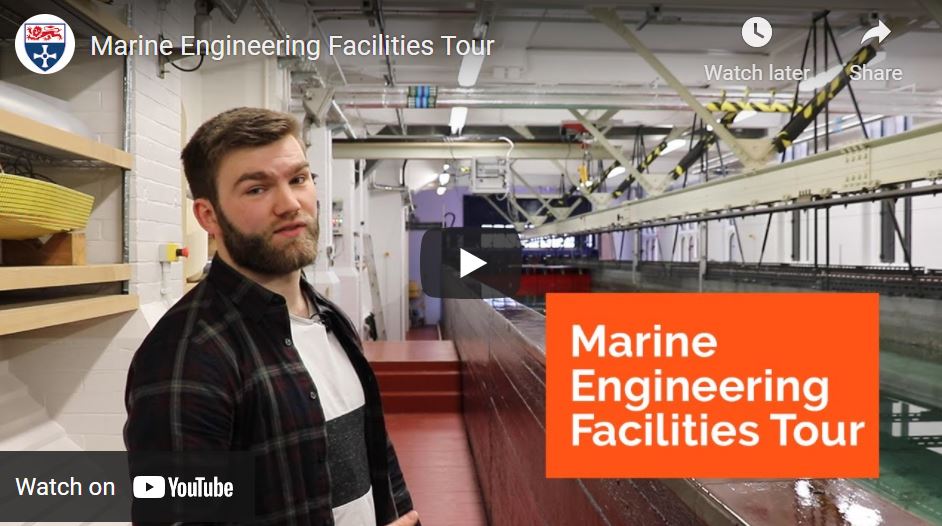Naval Architecture, Marine and Ocean Engineering MSc
Our Naval Architecture, Marine and Ocean Engineering MSc gives you the knowledge and skills to manage complex engineering problems across the maritime sector.
You are currently viewing course information for entry year:
Start date(s):
- September 2026
Overview
In this course you’ll combine technical knowledge of marine technology engineering subjects with practical industrial applications. This will help you develop the ability to manage complex engineering problems.
There is growing demand for marine technology focused engineers in the “blue economy”. Areas such as decarbonisation of shipping, transition to net zero, deep-water offshore renewables and subsea exploration all need engineers with specialist skills. This programme has two streams for you to choose from:
- Naval Architecture and Ocean Engineering
- Marine Engineering
You’ll develop advanced expertise in naval architecture, marine and ocean engineering. We will equip you with the skills and knowledge to meet industry demand and drive innovation across the sector.
We designed this Master's for both practising professionals and new graduates in areas such as:
- naval architecture
- marine engineering
- offshore engineering
- subsea and pipeline engineering
- offshore renewables
Important information
We've highlighted important information about your course. Please take note of any deadlines.
Please rest assured we make all reasonable efforts to provide you with the programmes, services and facilities described. However, it may be necessary to make changes due to significant disruption, for example in response to Covid-19.
View our Academic experience page, which gives information about your Newcastle University study experience for the academic year 2025-26.
See our terms and conditions and student complaints information, which gives details of circumstances that may lead to changes to programmes, modules or University services.
What you'll learn
Depending on your chosen modules, this course develops your knowledge and skills in:
- latest technology trends in the maritime technology sector
- propellers and turbines
- marine hydrodynamics
- naval architecture
- subsea technology and pipeline engineering
- advanced structural analysis to ships and offshore systems
- dynamic performance of marine and offshore systems
- risk assessment procedures
- designing mooring systems
- offshore operations
Our Master's in Naval Architecture, Marine and Ocean Engineering covers topics associated with:
- offshore renewable energy systems
- subsea systems
- marine technology
- maritime structures
- hydrodynamics
- marine propulsion
- energy and environmental performance
- data analytics
Modules
You will study modules on this course. A module is a unit of a course with its own approved aims and outcomes and assessment methods.
The module information below is intended to provide an example of what you will study.
Our teaching is informed by research. Course content changes periodically to reflect developments in the discipline, the requirements of external bodies and partners, and student feedback.
Full details of the modules on offer will be published through the Programme Regulations and Specifications ahead of each academic year. This usually happens in May.
To find out more please see our terms and conditions.
Optional modules availability
Some courses have optional modules. Student demand for optional modules may affect availability.
Modules
Compulsory modules
Marine Engineering Stream
Naval Architecture and Ocean Engineering Stream
Modules
Year One
Compulsory modules
Marine Transport Business (10 credits)
Future Marine Projects (10 credits)
Marine Engineering Design (20 credits)
Marine Engineering III (20 credits)
Dynamic Modelling and Simulation (10 credits)
Project & Report in Marine Engineering (40 credits)
Project Management Appreciation (10 credits)
Year Two
Compulsory modules
Marine Engineering Stream
Naval Architecture and Ocean Engineering Stream
How you'll learn
We have a multidisciplinary approach to teaching. You'll engage with students across all key maritime technology disciplines. This offers a rich and diverse learning experience.
Our teaching methods typically consist of:
- lectures
- seminars
- practical sessions
- group work
- personal supervision
Modules are taught by block delivery, allowing you to immerse yourself and understand the subject in more depth.
Our strong industrial engagement means our courses are shaped by industry.
The course is also available with a preliminary year if you do not meet the entry criteria for the one-year Master's course.
Depending on your modules, you'll be assessed through a combination of:
- Case study
- Design or creative project
- Dissertation
- Oral examination
- PC examination
- Problem-solving exercises
- Report
- Research proposal
- Research paper
- Written examination
- Written exercise
Dissertation
You'll engage in cutting-edge marine technology research that tackles global challenges such as:
- climate change
- marine pollution
- environmental impact
You’ll also have the opportunity to explore areas like ship performance and alternative propulsion design.
Building on the knowledge gained from your chosen modules, you’ll develop advanced research skills by working on a research project. Your project will typically align with current research within the School of Engineering or in collaboration with industry partners.
You'll choose an individual dissertation project. This may be theoretical, experimental, or involve the development of a simulation model of maritime engineering systems, including ship propulsion and power transmission systems. Our research strengths include:
- design of new propulsion configurations such as electric propulsion and fuel cell powered systems
- engine emission prediction and simulation
- data analytics for ship performance and optimisation
- ships' environmental and performance indexing
- performance analysis of abatement technologies and measures (eg SCR, alternative fuels, ballast water treatment systems, etc)
You may also have the opportunity to undertake a project sponsored by one of our industry partners.
Throughout your studies, you’ll have access to support from:
- academic staff
- personal tutors and research supervisors
- our University Student Services Team
- student representatives
- peers
You'll also be assigned an academic member of staff, who will be your personal tutor throughout your time with us. They can help with academic and personal issues.
Your teaching and learning is also supported by Canvas. Canvas is a Virtual Learning Environment. You'll use Canvas to submit your assignments and access your:
- module handbooks
- course materials
- groups
- course announcements and notifications
- written feedback
Dr Andrew Aspden
Lecturer in Thermofluid Dynamics
Dr Maryam Haroutunian
Lecturer in Marine Technology
Professor Zhiqiang Hu
Lloyds Professor of Offshore Engineering
Professor D John Mangan
Professor of Marine Transport and Logistics
Dr Rosemary Norman
Senior Lecturer
Dr Kayvan Pazouki
Senior Lecturer
Dr Yongchang Pu
Lecturer
Dr Weichao Shi
Reader in Net Zero Maritime Systems
Dr David Trodden
Lecturer in Marine Technology
Dr Ben Wetenhall
Lecturer
Dr Narakorn Srinil
Reader/Associate Professor in Subsea Engineering
Dr Yi Zhou
Lecturer in Marine Engineering
Your development
Our strong industrial engagement means that our degree programmes are shaped by industry and government policy.
Multidisciplinary Group Project
This module will allow you to work with students from different maritime disciplines on a practical engineering problem.
Your communication and team working skills will be enhanced by working with a multidisciplinary team. You'll benefit from a broad spectrum of maritime technology/engineering perspectives.
The Multidisciplinary Group Project involves information gathering, analysis and work delegation. You'll need to consider the following implications when undertaking your project:
- political
- economical
- social
- technological
- legal
- environmental
Site trips
We'll arrange local maritime-related industry trips. These will enhance your understanding of the operation, challenges and new advances in the maritime and offshore industry.
Your future
Graduate destinations
We have close links with industry and our graduates. This provides you with a network, allowing you to enhance your employability.
Graduates on this programme are prepared for wide range of careers across the globe in naval architecture, marine and ocean engineering sectors.
These include:
- classification societies
- ship operation
- marine design and consultancy
- offshore renewable industries
- subsea and pipeline industries
- shipbuilding and ship repair
This Master's also provides a route into further study at PhD level.
Our Careers Service
Our expert Careers Service is here to help you take the next steps in your professional life. We will support you while you’re studying with us and for up to three years after you graduate.
You will have access to expert one-to-one advice and guidance through our campus careers centre and online, along with digital resources, workshops, networking opportunities, and careers and recruitment events.
We’ve been awarded 5 QS Stars for Student Employability (2025). Many of our degrees are shaped by strong links with national and international businesses. We are committed to helping you access real-world experience opportunities and develop key skills through paid work placements and internships.
Quality and ranking
All professional accreditations are reviewed regularly by their professional body
If you’re studying an accredited degree and thinking about working in Europe after you graduate, the best place to find current information is the UK Government’s guidance on recognition of UK professional qualifications in EU member states. This official resource explains whether your profession is regulated in another country, what steps you need to take, and which organisation you should contact.
Facilities
You'll be part of the School of Engineering and you'll learn in state-of-the-art labs and fantastic facilities, many of which are unique to Newcastle University. You'll have access to our:
- unique large-scale laboratories to help you learn and understand concepts taught in class
- Blythe Marine Station and our high-speed research vessel, The Princess Royal
- cavitation tunnel to test models of propellers, turbines, submarines and more
- towing tank to conduct ship model experiments
- combined wind, wave and current tank to experience modelling of the full offshore environment
- hydrodynamics laboratory with wave-making and electronic recording equipment
- engine laboratories, which include facilities to test diesel engines
- dedicated computer cluster running specialist marine design software
- university, regional and national HPCs (High-Performance Computing)
Fees, Funding and Scholarships
Tuition fees for 2026 entry (per year)
As a general principle, you should expect the tuition fee to increase in each subsequent academic year of your course, subject to government regulations on fee increases and in line with inflation.
Depending on your residency history, if you’re a student from the EU, other EEA or a Swiss national, with settled or pre-settled status under the EU Settlement Scheme, you’ll normally pay the ‘Home’ tuition fee rate and may be eligible for Student Finance England support.
EU students without settled or pre-settled status will normally be charged fees at the ‘International’ rate and will not be eligible for Student Finance England support. You may be eligible for a scholarship worth 25% off the international fee. Search our funding database.
If you are unsure of your fee status, check out the latest guidance here.
Scholarships
We support our EU and international students by providing a generous range of Vice-Chancellor's automatic and merit-based scholarships. See our searchable postgraduate funding page for more information.
What you're paying for
Tuition fees include the costs of:
- matriculation
- registration
- tuition (or supervision)
- library access
- examination
- re-examination
- graduation
Find out more about:
If you are an international student or a student from the EU, EEA or Switzerland and you need a visa to study in the UK, you may have to pay a deposit.
You can check this in the How to apply section.
If you're applying for funding, always check the funding application deadline. This deadline may be earlier than the application deadline for your course.
For some funding schemes, you need to have received an offer of a place on a course before you can apply for the funding.
Search for funding and scholarships
Find funding available for your course
Entry requirements
The entrance requirements below apply to 2026 entry.
Qualifications from outside the UK
English Language requirements
Admissions policy
This policy applies to all undergraduate and postgraduate admissions at Newcastle University. It is intended to provide information about our admissions policies and procedures to applicants and potential applicants, to their advisors and family members, and to staff of the University.
University Admissions Policy and related policies and procedures
Credit transfer and Recognition of Prior Learning
Recognition of Prior Learning (RPL) can allow you to convert existing relevant university-level knowledge, skills and experience into credits towards a qualification. Find out more about the RPL policy which may apply to this course
How to apply
Using the application portal
The application portal has instructions to guide you through your application. It will tell you what documents you need and how to upload them.
You can choose to start your application, save your details and come back to complete it later.
If you’re ready, you can select Apply Online and you’ll be taken directly to the application portal.
Alternatively you can find out more about applying on our applications and offers pages.
Apply Online
Open days and events
Find out about how you can visit Newcastle in person and virtually
Overseas events
We regularly travel overseas to meet with students interested in studying at Newcastle University.
Get in touch
Questions about this course?
If you have specific questions about this course you can contact:
School of Engineering
School Admissions Team
Email: soe.admissions@ncl.ac.uk
General enquiries
For more general enquiries, you could also complete our online enquiry form.
Application enquiries
If you've got a question about your application, send us an enquiry via the application portal you applied through.
If you haven't applied yet, you can send your questions via our enquiry form.
Live chat
Our Ncl chatbot might be able to give you an answer straight away. If not, it’ll direct you to someone who can help.
You'll find our Ncl chatbot in the bottom right of this page.
Keep updated
We regularly send email updates and extra information about the University.
